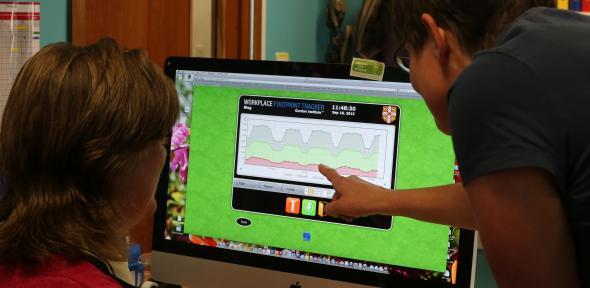
Hundreds of staff and students pledged their support and saved energy during the University’s second Switch Off Week. Held from 10 – 16 November, the week highlighted the role of the individual in reducing the University’s £16 million energy bill.
Staff and students have a role to play in how the University saves energy . Throughout the year the University’s Environment and Energy Section (E&E) implements projects to reduce the University environmental impact and promote sustainability, but although a team of ten can do a lot, they cannot do everything.
Switch Off Week demonstrated that small, simple actions by individuals all add up. Total electricity use was down by 0.24% during Switch Off Week, compared to the previous week (not adjusted for weather), with a kWh reduction of 4,938. However due to the variable research patterns, this figure may mask the individual successes.
Throughout Switch Off Week, the E&E Section collected pledges from people about how they were going to save energy. Many people pledged to change their habit of not turning off computers, monitors and other IT equipment, even overnight. Others resolved to dress more appropriately for cold weather- or to use only the lighting that was strictly required.
In addition to looking at their personal energy use, staff and students were invited to share their ideas, however big or small, about how the University as a whole can save energy.
Thoughts and events from across the week
This year, Switch Off Week saw 22 events running over 5 days. There were a diverse array of departments and researchers tackling the issue of energy and sustainability from their perspective.
Professor of Computer Science Ian Leslie spoke about new computer technology which can improve monitoring; Dr Carolin Crawford from Astronomy drew attention to the problem of light pollution caused by lights left on unnecessarily; Dr Bhaskar Vira, Director of the University of Cambridge Conservation Research Institute talked about energy from a development perspective; and Cambridge University EcoRacing, spoke about how innovation in technology can bring solutions to energy shortages.
The Switch Off Week Roadshow brought tools to help staff and students switch off and reduce their carbon footprint including stickers, posters and thermometers. The touring team were accompanied by an energy bike, on which passers-by could pedal to produce enough energy to power an energy-efficient light bulb, a tungsten light bulb, a screensaver and an iPod.
Tim Hele, a member of the Chemistry department, topped the energy bike leader board by powering 90 watts using pedal power for a 1 hour, 1 minute and 1 second; smashing Monday’s top score of 20 minutes, and Tuesday’s of 30 minutes. The average person can power the bike for 30 seconds before getting tired, proving the point that powering our everyday bits of kit takes more effort than we realise.
Switch Off Week was designed not only to illustrate the efforts that many individuals can make in one week, but also to change and create positive habits throughout the year.
Departments and offices who wish to continue the effort or to begin to reduce their energy consumption can still find resources and help from the Environment and Energy Section. Funding is also potentially available for a variety of energy saving measures, including improvements to IT equipment. Please see the Environment and Energy website: http://www.environment.admin.cam.ac.uk/ for both posters and stickers or for information on funding.
Department successes
Throughout Thermal Thursday, the Institute of Public Health treated their staff to a trolley of tea and hot chocolate as the building’s heating had been switched off. This saved the Institute 11.68% during the week compared to the previous week.
Kenmare House and Bailey Grundy Barrett Building won the Unified Administrative Service competition. They beat Old Schools and Greenwich House by reducing their energy use the most and saved themselves 10.09% this week compared to the previous week. This success was supported by a culture of shared responsibility - if someone left something on, they were letting the side down.
Centre for Mathematic Science have taken the opportunity to improve the automatic lighting controls in their library, meaning they now time out after 15 rather than 30 minutes, as well as fitting a master switch for one of their staff areas so that lightscan can now be completely switched off when the last member of staff leaves.
‘What next’
- E&E will continue implementing projects to make the University more sustainable and reduce our energy use – to keep in touch, sign up for Greenlines,
- E&E have launched the brand new ‘Empower’ tool designed to help individuals across the University understand how they can save energy.
- If you’re really keen on making a difference, why not become an Environment and Energy Coordinator?
- To discuss potential funding available for a variety of energy saving measures, including improvements to IT equipment, please contact environment@admin.cam.ac.uk.
